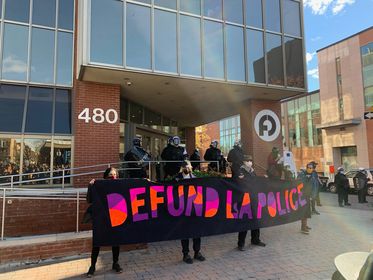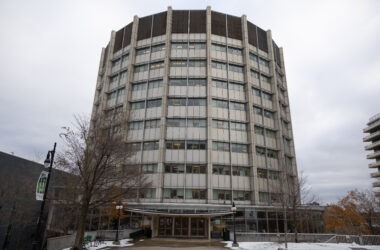Over 200 protesters gathered to call for the defunding of the Service de Police de la Ville de Montréal (SPVM) on Oct. 24 in a demonstration organized by the Defund the Police Coalition and Justice for Victims of Police Killings. This demonstration marks the 11th annual Justice for Victims of Police Killings vigil to honour the lives of victims of police violence in Montreal.
The demonstration began with speeches delivered at Sir Wilfrid Laurier Park in the Plateau-Mont-Royal district, before the group embarked on a three-hour long march west along Saint Joseph Boulevard. The energetic crowd continued south on Park Avenue, before turning eastward on Sherbrooke Street. The march ended nearly four kilometers south of the initial post at the Place des Festivals.
As they walked the crowd chanted “no justice, no peace, defund the police,” while playing music that pays homage to Black and Indigenous artists on personal devices. Speakers at the demonstration read aloud the names of victims of police killings across North America, including Bony Jean-Pierre and Breonna Taylor, who were murdered in 2016 and 2020 respectively.
The Defund the Police Coalition, formed in June 2020, has released a list of 10 demands for the SPVM, including a call for a 50 per cent reduction of its current budget of $662 million and a reallocation of those funds to underfunded community groups.
Elijah Olise, one of the organizers of the demonstration, emphasized the need to view the Defund the Police movement as one not solely focused on dismantling the police force, but also on reinvesting in communities across Montreal.
“Upholding peace through fear is not the right way to achieve an ideal society,” Olise said. “When you see that youth are plagued with housing issues, a lack of jobs, and a poor quality of life, in [communities] like Montreal North [and] Little Burgundy, [they] are then pushed to do these crimes. Once you provide resources to empower communities, you don’t need to police them.”
One activist, a graduate student in the Faculty of Science and member of Socialist Fightback McGill who wished to remain anonymous, grounded the history of police brutality in the rise of capitalism.
“When we look at [how] the police as an institution was incorporated into municipalities in today’s society, we see that it is just a reformed version of slave patrol,” the student said. “This is the same police that harassed gay and trans activists at Stonewall in 1969. The institution keeps reforming itself, but [this is] only treating a symptom of capitalism, not actually addressing the underlying issue.”
After a summer of historic civil unrest and with the U.S. presidential election fast approaching, some say that these protests are more important than ever. Jake Russell, an American citizen living in Montreal, linked the Defund the Police movement to the current political climate in the U.S., demanding a model of humanity over criminalization.
“We need to reevaluate how the police function in our society,” Russell said. “A lot of Americans do not agree with that xenophobia, racism, and sexism [….] The approach to societal problems should be harm reduction. The War on Drugs is a complete and utter failure. Drug addiction should be treated as a public health issue, rather than [punished via] the police.”
Jessica Quijano, a rally co-organizer, is a Montreal activist who coordinates justice initiatives including the Iskweu project at the Native Women’s Shelter of Montreal. She described how demonstrations serve to provide a therapeutic channel for those grieving loved ones lost to police brutality.
“I think [marching] changes the consciousness of society,” Quijano said. “It’s important that families who have lost someone see that people are in support of them, and it’s healing for many to see people go out to the streets to stand for them.”







